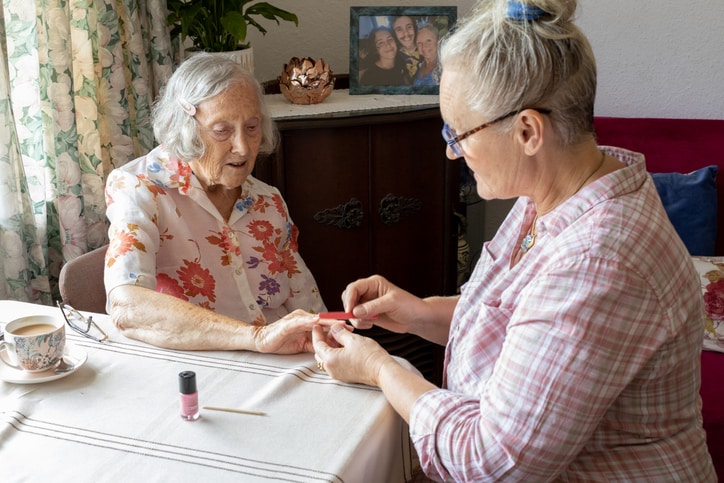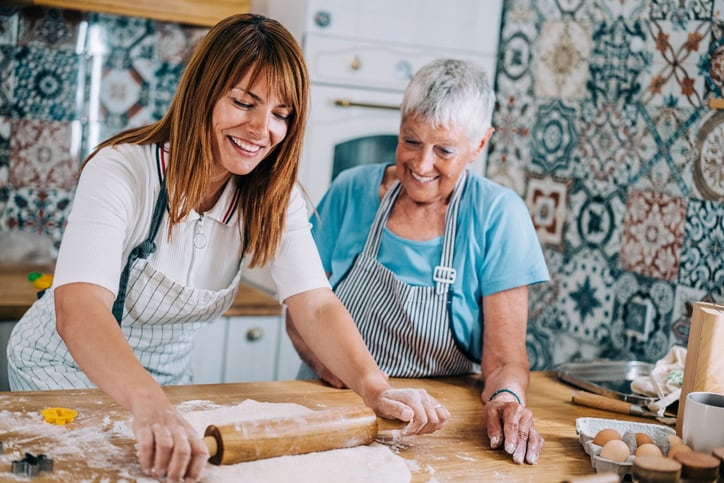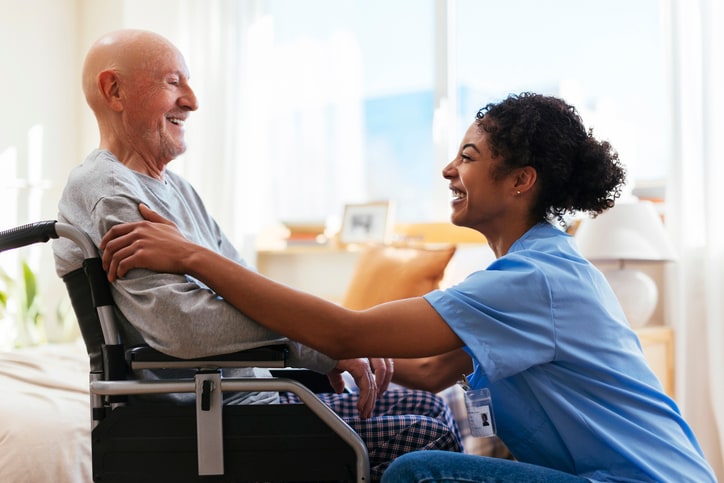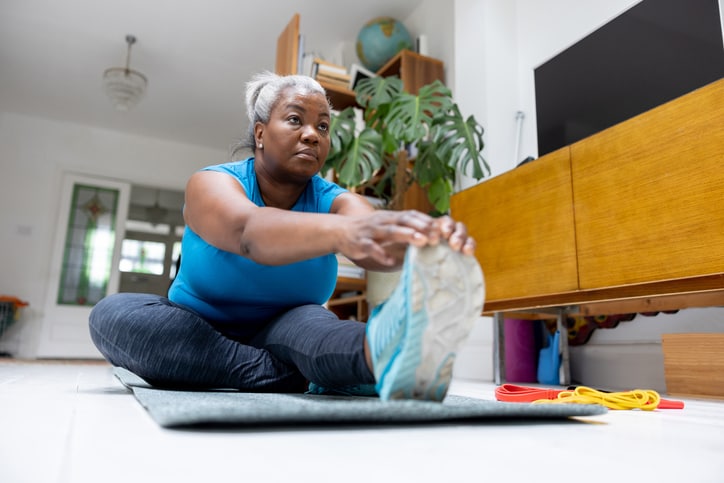We all know growing old is an unavoidable part of life. But it’s hard to face the reality that one day, our loved ones will become ill or debilitated, and potentially require us to step away from our own lives to care for them. In a society that doesn’t like to talk about aging or death, adults thrust into caregiving for senior relatives quickly find they are unprepared for the emotional, physical, financial and logistical challenges.
“Family caregiving is both challenging and rewarding,” says Kimberly Fraser, a nurse, a former professor, caregiving expert and author of “The Accidental Caregiver: Wisdom and Guidance for the Unexpected Challenges of Family Caregiving.”
Fraser, who holds her doctorate of philosophy in nursing, points out, “Family caregivers often want to be the one to provide care and support to their loved one.” But they must have appropriate support to do their caregiving well and maintain their own health and wellness, she says.
Here, a diverse group of 11 real family caregivers — past and present — reflect on what they wish they’d known earlier and the important lessons they learned along the way.
1. I couldn’t do it alone
I wish I had known…
“…how to ask for help and support from others, and how to value and take care of my own mental health. I eventually learned through trial and error and had a friend who was also a young family caregiver, who encouraged me to seek support. After many years, I also didn’t know that it would be one of the life experiences I am most proud of, because it showed me how resilient I am.”
Name and location: Amanda Rees in Los Angeles, CA
Job: CEO and cofounder of Bold, a digital health company focused on fitness for older adults
Family caregiver for: Recently deceased grandmother with dementia, blindness from glaucoma and stage 4 cancer.
2. I’d be denied access needed to help
I wish I had known…
“…how difficult it would be to get permissions to take over her life activities, even with a Power of Attorney, POA for Healthcare and HIPAA permissions already in place. For example, the cell phone company was 100% uncooperative. As I was not listed on her account and didn’t know her PIN, and neither did she, they refused to talk to me. I couldn’t pay her bill, change her address — nothing except cancel the account.”
Name and location: Nina McCollum in Cleveland, Ohio
Job: Content writer
Family caregiver for: Mother with cognitive impairments following an episode of medication-induced psychosis and hospitalization
” Understanding the time commitment and the emotional challenges associated with becoming a full-time caregiver has required a major adjustment in my life.”
—David Miller
3. It is so time-consuming — and rewarding
I wish I had known…
“While it has been challenging, caring for my father has been one of the greatest rewards of my life. Understanding the time commitment and the emotional challenges associated with becoming a full-time caregiver has required a major adjustment in my life. Initially, it was difficult realizing the complexities of my dad’s medical diagnosis and being able to secure medical/legal documents such as Medicare records, banking information and will and estate information.”
Name and location: David Miller in Washington, D.C.
Job: Ph.D. candidate in social work and author of children’s books
Family caregiver for: 83-year-old father with dementia and major depression
4. The financial cost of care is massive
I wish I had known…
“…that Medicare does not cover in-home care, and the cost of caring for a loved one can easily bankrupt a family in just a few short years.”
Name and location: Christina Keys in Vancouver, Washington
Job: Director of Community Growth at Caregiving.com
Family caregiver for: Mother since 2013, who had a stroke and left her paralyzed, and ex-boyfriend, who had a stroke in 2019 and now lives in an adult family home
5. Anyone can experience dementia
I wish I had known…
“…that my father would one day succumb to dementia. I never suspected that, or that he would be using a wheelchair for mobility or living in a nursing home. He was an avid marathon runner, had a photographic memory and worked without issue until he was 78 years old. As a transsexual man, I wonder what it will be like when my dad forgets me as I am now — his son — but remembers me as I used to be, as his daughter. What has surprised me the most is the near total lack of available dementia trained nursing home staff caring for my father.”
Name and location: Zander Keig, Orlando, Florida
Job: Co-founder of the LGBTQ Caregiver Center, licensed clinical social worker and health educator, US Coast Guard veteran
Family caregiver for: 81-year-old father with dementia who resides in the Florida Nursing Home for Veterans (he served in the US Marine Corps)
6. I underestimated the realities of caregiving
I wish I’d known…
“…to listen to my mom’s doctor when he said she would never recover. I truly thought my mom could do anything and would recover. I also wish I had known that caregiving would take eight years of my life and change me and my relationships forever, though I am grateful for the time I had with both of my parents during their final years; it was a true blessing.”
Name and location: Lori Ramos Lemasters in Denver, Colorado (though relocated to California while caregiving)
Job: Author of “You’re a Caregiver Not a Saint, Yeah Write!” and founder of Care Partners Resource
Family caregiver for: Mother who survived a massive stroke and father who was on dialysis and had early onset dementia (both have passed)
7. It boosts your connection
I wish I’d known…
“…that the personal sacrifices are worthy of the end result: The human connection and knowing your efforts and attention can add to the quality of life for someone you love. I learned so many lessons about patience, forgiveness, and making sure to connect on a personal, human level with my loved ones. Don’t let the daily tasks and list of ‘to do’s’ take the place of the personal relationship — always make the effort to carve out time for doing something fun together in addition to the time spent going to doctor’s appointments or doing the laundry, doing their medications or cooking and cleaning.”
Name and location: Michelle Boyaner in Los Angeles, California
Job: Filmmaker; writer, director, producer of documentary “It’s Not A Burden: The Humor and Heartache of Raising Elderly Parents”
Family caregiver for: Grandmother with dementia and mother with cognitive impairment and then dementia (both have passed). Now helps father with respiratory issues and cognitive decline.
“Have the tough conversations while everyone is of sound body and mind.”
— Dawnita Brown
8. We should have done estate planning earlier
I wish I’d known…
“…that we [should have] had all of her estate planning documents in place (e.g. advanced directives, power of attorney, medical orders for life-sustaining treatment, etc.). In 2016, I moved to Africa to serve as a Community Health Peace Corps Volunteer, and before I left, my mama and I had a Power of Attorney drawn up for me and not for her. In 2018, she suffered a brainstem stroke and was on life support. I flew home the next day, and due to the severity of her stroke, I instantly became her decision-maker. While her cognitive capacity after 4.5 years is not at 100%, she is able to make her own decisions based on her end-of-life wishes. Subsequently, I learned that some of the decisions that I had made when she was fully incapacitated were not her wishes. The moral of the story: Have the tough conversations while everyone is of sound body and mind.”
Name and location: Dawnita Brown in Baltimore, Maryland
Job: Full-time sole caregiver and founder of Hey Caregiver! which offers support groups, a podcast, and education for the Black family caregiver community
Family caregiver for: 72-year old mother, a brainstem stroke survivor
“Watching my mom struggle, seeing how the doctors talked to me and not to her, seeing how she was losing her independence (and she was fiercely independent) were all struggles for me.”
— LISA IANNUCCI
9. It would take a huge toll on me
I wish I’d known…
“…doing this was completely physically and emotionally taxing. Watching my mom struggle, seeing how the doctors talked to me and not to her, seeing how she was losing her independence (and she was fiercely independent) were all struggles for me. And I needed flexibility because she would need so many doctor appointments. I worked from home, but couldn’t figure out the balance for quite awhile and work suffered.”
Name and location: Lisa Iannucci in Poughkeepsie, New York
Job: Entertainment writer and author
Family caregiver for: Elderly mother who passed away earlier this year at age 86
10. I needed outside experts and resources
I wish I’d known…
“…that caring for my mother required so many components to her caregiving, such as having an advocate assigned to her such as a Social Worker, who can tap into Senior Services. This was a huge learning curve for me, especially at the very beginning of her care. It was because she ended up in the hospital that actually started the wheel turning, and for her receiving all the Senior Services she benefits from today. Having a voice behind the scenes has taken a huge weight off me.”
Name and location: Victor Kelly in Silver Spring, Maryland
Job: Service technician for utility company
Family caregiver for: 90-year-old mother with dementia
11. Advocacy for your loved ones is exhausting but vital
I wish I’d known…
“…how important advocacy is in the care of the elderly, and consequently, how time-consuming and stressful that advocacy is to do well. It’s important to know that family caregiving for your elders is a marathon and not a sprint, meaning it’s important to reserve some time for self-care and to know when it’s OK not to reach for perfection. Eldercare is punctuated by emergencies; I’ve learned that being organized, having a plan and having the paperwork in place can help you stay in care mode, rather than panic mode.”
Name and location: Suzanne Asaff Blankenship in Golden, Colorado
Job: Speaker and author of “How To Take Care of Old People Without Losing Your Marbles”
Family caregiver for: Elderly mother for over 10 years, and co-caregiver for father-in-law for 3+ years and mother-in-law for over 12 years.




